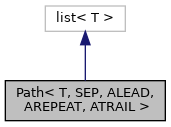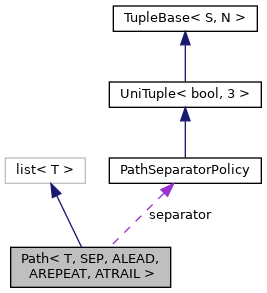|
|
| Path (const path_t &p) |
| | Copy constructor.
|
| |
|
| Path (typename path_t::const_iterator it, typename path_t::const_iterator it2) |
| | Secondary copy constructor. Handy for creating a parent path, for example.
|
| |
|
template<typename ... TT> |
| | Path (const path_t &arg, const TT &... args) |
| | Initialize with a path.
|
| |
|
template<typename ... TT> |
| | Path (const std::string &arg, const TT &... args) |
| | Initialize with a path.
|
| |
|
template<typename ... TT> |
| | Path (const char *arg, const TT &... args) |
| | Initialize with a path.
|
| |
|
virtual | ~Path () |
| | Why the three above instead of this?
|
| |
|
template<typename ... TT> |
| void | set (const TT &... args) |
| |
|
template<typename T2 , typename ... TT> |
| void | append (const T2 &arg, const TT &... args) |
| | Append path with element(s), path(s) or string(s).
|
| |
|
template<typename ... TT> |
| void | append (const path_t &p, const TT &... args) |
| |
|
template<typename ... TT> |
| void | append (char c, const TT &... args) |
| |
|
template<typename ... TT> |
| void | append (const char *arg, const TT &... args) |
| |
|
template<typename ... TT> |
| void | append (const std::string &arg, const TT &... args) |
| |
|
void | appendPath (const char *p) |
| | Specialized handler for strings (note, possibly: elem_t==std:string)
|
| |
|
void | appendPath (const path_t &p) |
| |
|
void | appendElem (const elem_t &elem) |
| | Main method for adding elements.
|
| |
|
template<typename T2 > |
| void | appendElem (const T2 &elem) |
| | To be specialized in subclasses.
|
| |
| bool | isRoot () const |
| | Returns true, if the path as only one element which is empty. An empty path is not a root.
|
| |
| bool | hasRoot () const |
| | Returns true, if the path is not empty and the first element is empty.
|
| |
| path_t & | ensureRoot () |
| | Returns true, if the path is not empty and the first element is empty.
|
| |
| void | trimHead (bool COMPLETE=false) |
| | Removes leading empty elements. The resulting string presentation will not start with the separator.
|
| |
|
void | trimTail (bool COMPLETE=false) |
| | Removes trailing empty elements. The resulting string presentation will not end with the separator.
|
| |
| void | simplify () |
| | ORIGINAL. Removes trailing empty elements, except for the root itself.
|
| |
|
void | simplifyHead () |
| | Remove duplicates of empty elements from the start.
|
| |
|
void | simplifyTail () |
| | Remove duplicates of empty elements from the end.
|
| |
| path_t & | operator= (const path_t &p) |
| | Assigns a path directly with std::list assignment.
|
| |
| template<class T2 > |
| path_t & | operator= (const Path< T2 > &p) |
| | Conversion from str path type.
|
| |
|
path_t & | operator= (const std::string &p) |
| |
|
path_t & | operator= (const char *p) |
| |
| path_t & | operator<< (const elem_t &elem) |
| | Append an element, unless empty string.
|
| |
|
path_t & | operator<< (const path_t &path) |
| |
|
template<class T2 > |
| path_t & | operator<< (const T2 &strlike) |
| |
|
path_t & | operator>> (elem_t &e) |
| | Extract last element.
|
| |
|
virtual std::ostream & | toStream (std::ostream &ostr) const |
| | Path is written like a list, adding the separator between items. Exception: root is displayed as separator.
|
| |
|
virtual std::string | str () const |
| |
|
virtual | operator std::string () const |
| |
|
std::ostream & | debug (std::ostream &ostr=std::cout) const |
| |
template<class T, char SEP = '/', bool ALEAD = true, bool AREPEAT = false, bool ATRAIL = true>
class drain::Path< T, SEP, ALEAD, AREPEAT, ATRAIL >
- Template Parameters
-
| T | - path element, eg. PathElement |
| SEP | - separator char |
| ALEAD | - accept leading separator |
| AREPEAT | - accept repeated separators |
| ATRAIL | - accept trailing separator |




 1.9.8
1.9.8